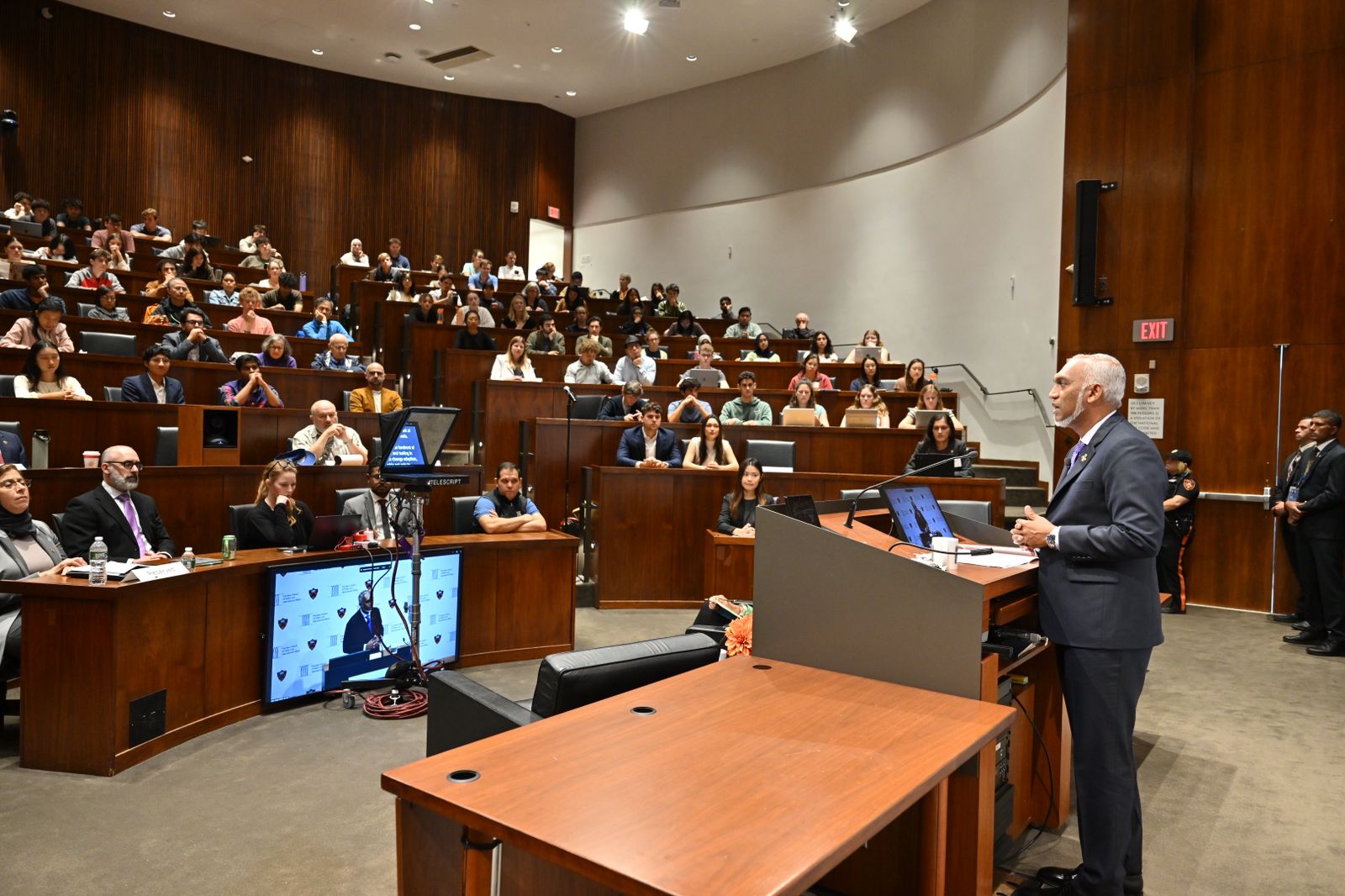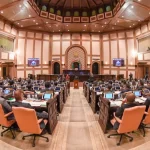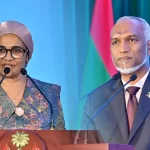PRINCETON, New Jersey — In a thoughtful address at Princeton University on Thursday, President Dr. Mohamed Muizzu offered a vivid portrait of Maldives’ strategic importance in the modern world. Speaking at the prestigious School of Public and International Affairs, Muizzu drew attention to the central role the Maldives plays in global trade and energy security, as well as the pressing need for climate action and international cooperation.
“If you’ve ever bought a product which was delivered through global container shipping, there’s a good chance it came through my neighborhood,” he said, setting the stage for a talk that underscored how small nations like the Maldives punch above their weight on the world stage. “Over fifty percent of the world’s daily oil consumption passes through the Indian Ocean. So clearly, an important region,” he added, as he described the Maldives’ position at the heart of these sea routes.
The speech, given just day after Muizzu represented the Maldives at the United Nations General Assembly, celebrated the island nation’s 59th anniversary as a member of the international body.
Reflecting on this journey, Muizzu recalled that in 1965, few had even heard of the Maldives, with some UN delegations needing to reach for their almanacs to locate it. Now, however, the Maldives is a recognized development success story. “Our white sandy beaches, our clear blue waters, the gardens of life under our seas – are known to the world.”
But it was not all self-congratulation. Muizzu used the platform to deliver a sharp critique of current global trends, particularly concerning the ongoing violence in Gaza. “In these dark days of war, genocide in Gaza, the suppression of human rights… it is vital US institutions continue to uphold these principles themselves.” He emphasized the role universities, like Princeton, must play as “bastions of thought and expression,” where peaceful protest and critical debate are both necessary and constructive.
President Dr. Mohamed Muizzu was introduced by a first-year PhD student, while the session itself was opened by Dean Amani Jamal of the Princeton School of Public and International Affairs.
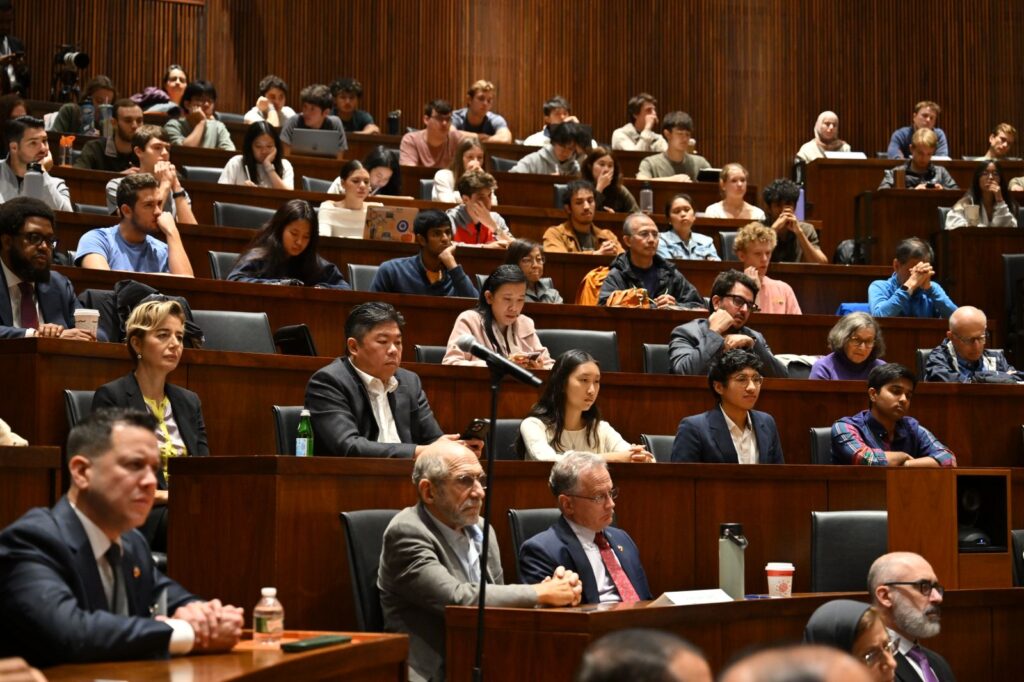
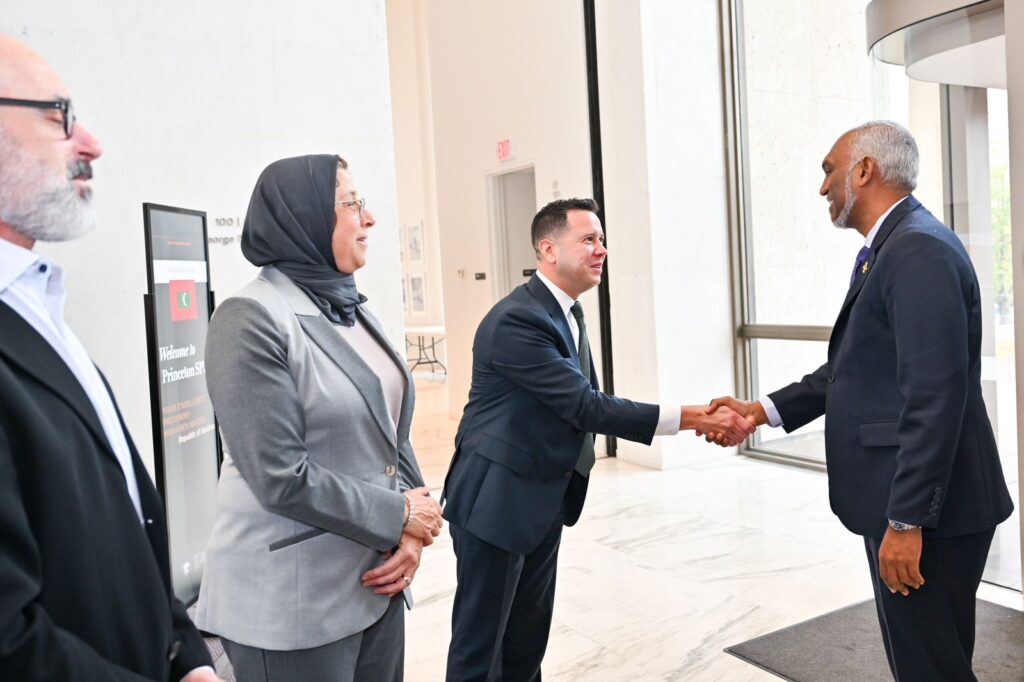
At the heart of Muizzu’s message was a call to strengthen the rule-based international order, particularly in the Indian Ocean, which he described as the crossroads of global trade. “The respect for sovereignty and sovereign equality among states are the fundamental principles on which today’s international order rests,” he said. He pledged that under his leadership, the Maldives would continue to advocate for multilateralism, seeing it as a crucial means to safeguard his nation’s sovereignty.
Muizzu’s vision for the Maldives is not merely about protecting its borders but also about expanding its role in global affairs, particularly in addressing the climate crisis. “Since I assumed office, the Maldives has stepped up its advocacy for immediate action in managing the climate crisis,” he said, calling for reforms to the international financial architecture to help Small Island Developing States (SIDS) access climate adaptation finance.
He highlighted several bold initiatives under his administration, including a plan to generate 33 percent of the country’s electricity through renewable energy by 2028. “We’re experimenting with floating solar panels and investing in better waste management,” he noted. One of the more ambitious projects Muizzu announced was the development of Ras Malé, a climate-friendly eco-city designed to drive innovation while empowering women and youth.
As the Maldives continues to assert itself on the global stage, Muizzu sees these environmental efforts as vital not only to his country but to the world. “Small island states are believed to support 20 percent of the world’s terrestrial biodiversity. They host forty percent of the world’s coral reefs. They’re at the forefront of research and testing in climate change adaptation, valuable not only to themselves but to wider humanity.”
The speech was also laced with personal reflections, as Muizzu recounted his time as a student, obtaining his doctorate in civil engineering from the University of Leeds in Britain. Now, standing before an audience of Princeton students, he noted how much he cherished those years and his return to academia. “It wasn’t too long ago that I was in your seats – as a student,” he said with a smile.
Yet the President’s message was clear: the stakes today are higher than ever, and the Maldives, though small, has a crucial role to play in shaping the future. Whether through advocating for environmental protection or strengthening democracy and state capacity, Muizzu sees his country as pivotal to the future of the Indian Ocean and beyond. “A prosperous, strong, and fiercely independent Maldives is important to us all.”
As his address concluded, Muizzu left the audience with a powerful reminder of the importance of small states in the global order. “We are often the frontline of man’s relationship with the environment and sometimes a bellwether of things to come for other parts of the world. The world, our lives, would simply not be the same without them.”
After delivering his speech, President Muizzu engaged in a lively Q&A session with Princeton University students, moderated by journalist Razia Iqbal. The session opened with a question on climate change and the Maldives’ role in global greenhouse gas emissions. President Muizzu eloquently explained that, as a small island nation, the Maldives is on the receiving end of the climate crisis despite contributing minimally to global emissions.
Iqbal steered the conversation to the “India Out” campaign, asking about the presence of Indian troops in the Maldives. When she pointed out that there were only 78 Indian personnel, President Muizzu responded firmly, saying, “The people of the Maldives do not want even a single one.” He explained that the issue had been resolved through diplomacy, with the troops replaced by civilians.
The discussion also touched on the Ras Malé eco-city project and the country’s need for international support. Iqbal pressed him on whether the 20 agreements signed with China were part of that initiative. Muizzu clarified that the Maldives welcomes collaboration from China, India, the U.S., and other nations in the Ras Malé development.
One student raised a question about the Maldives’ decision to ban Israeli passport holders, to which President Muizzu responded that the policy is not aimed at any specific religious group and is currently under parliamentary review.
Another student asked how the President first entered public service, and Muizzu shared that he was inspired by his father, a distinguished public servant, who instilled in him a sense of duty to the people.
When the topic shifted to LGBTQ issues, the President brushed it off, stating, “The Maldives is an Islamic country and follows Islamic traditions, which are enshrined in the constitution.”
The Q&A session took place at the Princeton School of Public and International Affairs (SPIA), in the Arthur Lewis Auditorium at Princeton University.
The session was attended by several dignitaries, including the U.S. Ambassador to the Maldives, the Maldives’ Foreign Minister, the Maldives Ambassador to Washington, the Maldives Permanent Representative to the UN, and other ministers accompanying President Muizzu on his official visit.
